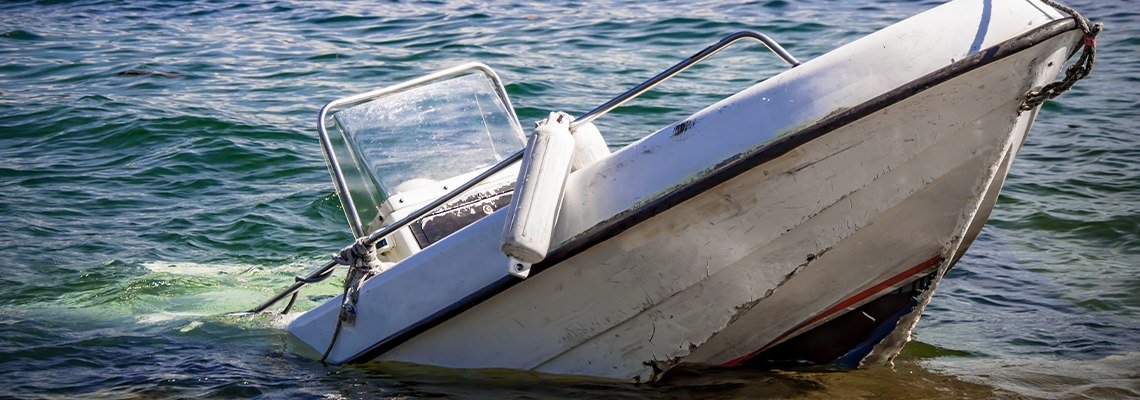
Boating Accidents: Key Steps for Filing Personal Injury Claims
Boating accidents can result in life-altering injuries and even fatalities. Whether you’re a recreational boater, a professional, or a passenger, a boating accident can happen when you least expect it. Accidents can occur due to a variety of factors, including operator negligence, poor weather conditions, or mechanical failure.
When boating accidents happen, those who are injured may be entitled to seek compensation for their damages through a personal injury claim. However, filing a personal injury claim after a boating accident can be complicated, and knowing the proper steps to take can significantly impact the outcome of your case.
At Downs McDonough & Foley, LLC in Durango, Colorado, we have extensive experience helping those injured in boating accidents understand their legal rights. We’ll walk you through the key steps for filing a personal injury claim after a boating accident, how Colorado law applies to these types of accidents, and the potential for compensation.
Protect Your Safety and the Safety of Others
The first priority after a boating accident should always be to prioritize your safety and the safety of others involved. Here’s what you need to do immediately after the accident:
Assess injuries: Check yourself and others for any signs of injuries. If there are injuries, call 911 immediately to get emergency medical assistance. Injuries from boating accidents can range from minor cuts and bruises to serious head trauma, broken bones, or drowning.
Secure the area: If possible, move away from any immediate dangers. This could mean moving to another part of the boat or getting out of the water if you’re on a vessel that’s sinking or leaking.
Provide assistance: If you’re able to, help any injured passengers get to safety. If you or someone else is in need of medical help, don’t hesitate to call for assistance.
Document injuries: If you’re able to, take notes or photographs of any visible injuries. This documentation can later be useful in your injury claim.
These actions are not only critical to protecting health and safety; they also form the first step in preserving important evidence for your potential personal injury claim.
Report the Boating Accident to Authorities
In Colorado, you’re required to report a boating accident to law enforcement if:
The accident results in injury or death.
The property damage exceeds $500.
A person is missing or presumed dead.
Reports can typically be made to the Colorado Parks and Wildlife (CPW) or the local law enforcement authorities. The CPW provides a Boating Accident Report form that can be filled out and submitted. This report will serve as an official record of the accident and can be an important piece of evidence in your personal injury claim.
Be as thorough and accurate as possible when filing the accident report. Include all relevant details about the crash, including:
The cause of the accident (e.g., collision with another boat, operator error, mechanical failure, weather conditions).
The location, time, and conditions of the accident.
Any witnesses to the accident.
The names and contact details of the parties involved, including boat operators and passengers.
Failing to report the accident or submitting an incomplete or inaccurate report could complicate your claim or reduce your chances of obtaining compensation.
Seek Immediate Medical Attention
Even if you don’t think your injuries are serious, it’s crucial to seek medical attention after a boating accident. Some injuries may not be immediately obvious, especially if you’ve sustained head trauma, neck injuries, or internal injuries. Additionally, getting a medical evaluation will:
Establish a clear medical record of your injuries.
Help your personal injury claim by providing documentation of the extent of your injuries.
Offer timely treatment that could improve your chances of recovery.
Be sure to follow through with any recommended treatments and document all medical expenses. If you need ongoing care, such as physical therapy or surgeries, make sure these costs are also included in your records. Medical records are crucial when it comes to filing a personal injury claim and proving the severity of your injuries.
Gather Evidence and Documentation
As with any personal injury claim, the more evidence you have, the stronger your case will be. The steps you take immediately after the boating accident can significantly influence the success of your claim. Collecting evidence includes:
Photographs: Take pictures of the accident scene, the damage to the boat, visible injuries, and any other relevant details. Photos of the conditions at the time of the accident (e.g., weather, visibility, equipment failure) can also provide context for the incident.
Witness statements: If there were any witnesses to the accident, get their contact information and ask them to provide a written statement or verbal testimony. Independent witnesses can corroborate your account of the accident, which may help in proving liability.
Boating license and registration information: Record the details of the boats involved, including registration numbers, boat operator licenses, and any relevant permits. This information will be necessary when filing a claim against the operator of the other boat or identifying the responsible party.
Police report: As mentioned earlier, law enforcement will likely file a report after the accident. Make sure to obtain a copy of this report for your records.
The more evidence you can gather, the better your chances of building a strong case for compensation. Your personal injury attorney will also help make sure that all necessary evidence is collected and preserved.
Identify the Liable Party
In order to file a personal injury claim, you must identify who is liable for the boating accident. This will depend on the circumstances of the accident. Potentially liable parties include:
Other boat operators: If another boater’s negligence caused the accident (e.g., speeding, failure to yield, boating under the influence), that operator may be liable for your injuries.
Boat manufacturers or maintenance companies: If the accident was caused by a mechanical failure or defect, the manufacturer of the boat or the company responsible for its maintenance could be held liable.
Government entities: If the accident was caused by poorly maintained infrastructure, such as an unsafe dock or malfunctioning navigation aids, a government entity may be responsible.
Determining liability in boating accidents can be complicated, especially when multiple parties are involved. An experienced personal injury attorney can help investigate the incident, gather all relevant evidence, and identify the responsible parties.
Consult With a Personal Injury Attorney
Working through the legal process after a boating accident can be challenging, particularly when dealing with complicated issues such as liability, insurance claims, and the collection of evidence. Working with a personal injury attorney who is experienced in boating accidents can make a significant difference in the outcome of your case.
An attorney will:
Help you understand your legal rights and options.
Investigate the accident, including interviewing witnesses and experts.
Handle communications with insurance companies and negotiate settlements.
Represent you in court if your case goes to trial.
Boating accidents often involve complicated liability issues, especially if they involve multiple parties or conflicting insurance claims. An attorney will make sure that your interests are protected and that you aren’t taken advantage of during the legal process.
File the Personal Injury Claim
Once you’ve collected evidence, consulted with an attorney, and identified the liable parties, the next step is to file your personal injury claim. In Colorado, personal injury claims stemming from boating accidents typically fall under maritime or general personal injury law, depending on the circumstances of the case.
Your attorney will file the necessary paperwork with the appropriate courts or insurance companies. This may include submitting the following:
A formal complaint outlining the facts of the accident and the legal basis for your claim.
Documentation supporting your injuries and the financial damages you’ve incurred (e.g., medical bills, lost wages, pain and suffering).
Any other evidence that establishes negligence or liability on the part of the defendant.
The timeline for filing a personal injury claim will depend on the specific facts of the case and the statute of limitations. In Colorado, the statute of limitations for personal injury claims is typically three years from the date of the accident, although this time frame can vary depending on the circumstances.
Negotiate a Settlement or Go to Trial
After filing your claim, the insurance company or liable party may offer a settlement. In many cases, it’s possible to settle out of court. However, settlements can sometimes be lower than what you’re entitled to, especially if you don’t have strong legal representation.
If a fair settlement can’t be reached, your attorney will prepare your case for trial. In a trial, your attorney will present evidence, call witnesses, and argue your case in front of a judge or jury.
Boating accidents can involve complicated legal questions and high stakes. Having an attorney who is experienced in personal injury law will help make sure that you aren’t pressured into accepting an unfair settlement.
Contact an Experienced Personal Injury Attorney
If you’ve been injured in a boating accident, it’s crucial to take the necessary steps to protect your health, legal rights, and financial future. By following the proper steps and working with the attorneys at Downs McDonough & Foley, LLC, you can simplify the claims process. Our firm works with clients in Durango, Colorado, and nearby areas, including Telluride, Pagosa Springs, Cortez, and the Four Corners. Contact us today to learn more about our legal services.

